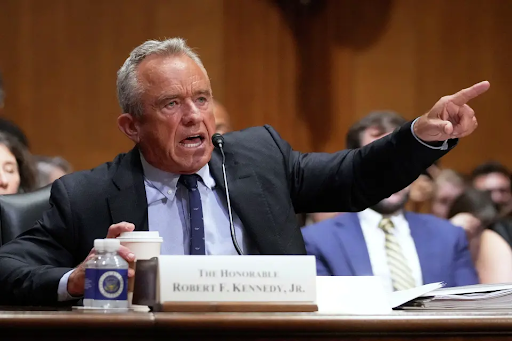RFK Jr.’s War on the CDC Risks Public Trust
Health Secretary Robert F. Kennedy Jr. arrives for a tense Senate hearing, where lawmakers from both parties challenged his leadership over vaccine policy and recent upheavals at the CDC. Source: Houston Chronicle.
Secretary Robert F. Kennedy Jr. told U.S. Senators at his September 4th hearing that the CDC had "failed miserably during the pandemic" and needed new leadership to regain the trust of the American people. RFK Jr. also defended his recent firing of CDC Director Susan Monarez, who had been in the role for only one month. Monarez disagreed with her expulsion and claimed her removal was a result of her refusal to approve sweeping vaccine policy changes that lacked scientific support. Monarez's disagreement with RFK Jr. revealed a core problem: RFK Jr. frames his operating decisions as “restoring trust,” but the evidence suggests that his actions undermine scientific independence.
The most notable exchange from the hearing came when senators asked RFK Jr. about COVID-19 vaccines; he claimed that “nobody knows” the figure surrounding the number of deaths the vaccines prevented because the data is unreliable. However, peer-reviewed research published by The Lancet Infectious Diseases and collaborative studies published by the CDC found that COVID-19 vaccines prevented 14.4 million deaths. In 2021, the CDC discovered that vaccinated adults were six times less likely to die from COVID-19 than unvaccinated adults. RFK Jr.'s refusal to acknowledge and engage with that evidence clearly shows his leadership is influenced more by distrust and political ideology than science.
Beyond the rhetoric, RFK Jr. has begun to reshape the Advisory Committee on Immunization Practices, replacing reputable members with critics of the previously established vaccine policy. His supporters argue this reshaping broadens viewpoint representation, but in reality, it skews federal vaccine guidance toward political ideology rather than scientific consensus. The implication is that public health recommendations may shift from prioritizing community protection to catering to partisan interests, ultimately eroding public trust in government institutions. Over time, this shift could undermine compliance with health measures and deepen polarization. Advisory Committees are supposed to weigh evidence-backed data, not amplify doubt. If the committee's work becomes politicized, parents deciding on whether to vaccinate their children will face even more confusion than what is already circulating. This confusion is especially concerning following the rise of the online anti-vax movement, which already spreads misinformation at a massive scale and thrives on contradictory messages from official institutions. Studies from The Lancet have shown that vaccine hesitancy increases when public health guidance appears misleading or politically motivated. When trusted advisory bodies publish guidelines shaped by ideology rather than science, they risk legitimizing misinformation and reducing vaccination rates, eroding the sanctity of public health.
The September hearing also exhibited major bipartisan concern. Republican Senator Bill Cassidy, a certified physician, accused RFK Jr’s department of “effectively denying American people vaccines,” alluding to confusion amongst doctors and patients who qualify for the vaccines. Cassidy read from examples of people who were turned away at doctors’ offices because boosters were no longer available. Meanwhile, Democratic senators warned that RFK Jr’s recent approach is undermining the credibility of federal health institutions and showcasing an increase in political influence in institutional decisions. According to a 2025 survey by the Kaiser Family Foundation, 61% of Americans trust the CDC a great deal or fair amount to provide reliable information about vaccines; this is down from 67% in 2023. Less than half of Americans believe the CDC and other federal agencies act without political pressure. These numbers reveal how trust is already falling. If RFK Jr. continues to politicize vaccine policy, Americans risk seeing trust fall further. Lower trust makes it harder to persuade people to follow health guidance when the next crisis arrives.
Many Americans may agree with RFK Jr. COVID-19 shook trust in experts as shifting guidance on masking and the transmission of the disease left many people skeptical, and confidence in the CDC fell from nearly 82% in February 2020 to 56% in June 2022. However, accountability means fixing previous mistakes with more robust scientific evidence, not dismissing science that contradicts political ideology. Monarez and former CDC leaders testified against RFK Jr., alleging he pressured them to rubber-stamp changes in vaccine mandates without reputable data justifying the changes, describing it as “political interference” that threatened public health. That is not reform; it is replacing evidence with ideology.
For you, for me, for us, the consequences are immediate. When the CDC issues its flu vaccine guidance this upcoming fall, will you believe it? How will society interpret their guidance? The World? Will parents be willing to trust their new childhood vaccine schedules? If RFK Jr. continues to treat scientific data as optional, the public will confront these questions without clear answers.
RFK Jr. says he is restoring trust in U.S. federal health institutions. His record shows otherwise; he is betting on distrust, hoping that Americans are more angry at institutions than committed to scientific evidence. That may play well in the political world, but for American public health, it is a dangerous gamble.

